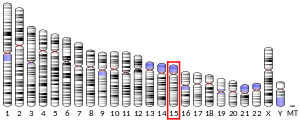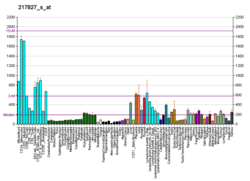Genes on human chromosome 15Human chromosome 15 gene stubs
5132427965ENSG00000090487ENSMUSG00000032388Q9NZD8Q9CQC8proteingeneinteractCD4
‹ The template Infobox gene is being considered for merging. ›
| SPG21 |
|---|
|
| Identifiers |
|---|
| Aliases |
SPG21, ACP33, GL010, MAST, BM-019, spastic paraplegia 21 (autosomal recessive, Mast syndrome), maspardin, ABHD21, SPG21 abhydrolase domain containing, maspardin |
|---|
| External IDs |
MGI: 106403 HomoloGene: 9603 GeneCards: SPG21 |
|---|
| Gene location (Human) |
|---|
 | | Chr. |
Chromosome 15 (human)[1] |
|---|
| | Band |
15q22.31 |
Start |
64,963,021 bp[1] |
|---|
| End |
64,990,310 bp[1] |
|---|
|
| Gene location (Mouse) |
|---|
 | | Chr. |
Chromosome 9 (mouse)[2] |
|---|
| | Band |
9 C|9 35.32 cM |
Start |
65,460,947 bp[2] |
|---|
| End |
65,488,470 bp[2] |
|---|
|
RNA expression pattern |
|---|
 | | More reference expression data |
|
| Gene ontology |
|---|
| Molecular function |
• CD4 receptor binding
• protein binding
|
|---|
| Cellular component |
• Golgi apparatus
• endosome membrane
• trans-Golgi network transport vesicle
• membrane
• endosome
• intracellular membrane-bounded organelle
• cytosol
• cytoplasm
|
|---|
| Biological process |
• antigen receptor-mediated signaling pathway
|
|---|
Sources:Amigo / QuickGO
|
|
| Orthologs |
|---|
| Species |
Human |
Mouse |
|---|
| Entrez |
|
|
|---|
| Ensembl |
|
|
|---|
| UniProt |
|
|
|---|
| RefSeq (mRNA) |
|
|---|
NM_001127889
NM_001127890
NM_016630 |
|
|
|---|
| RefSeq (protein) |
|
|---|
NP_001121361
NP_001121362
NP_057714 |
|
|
|---|
| Location (UCSC) |
Chr 15: 64.96 – 64.99 Mb |
Chr 9: 65.46 – 65.49 Mb |
|---|
PubMed search |
[3] |
[4] |
|---|
| Wikidata |
| View/Edit Human |
View/Edit Mouse |
|
Maspardin is a protein that in humans is encoded by the SPG21 gene.[5][6][7]
The protein encoded by this gene was identified by a two-hybrid screen using CD4 as the bait. It binds to the hydrophobic C-terminal amino acids of CD4 which are involved in repression of T cell activation. The interaction with CD4 is mediated by the noncatalytic alpha/beta hydrolase fold domain of this protein. It is thus proposed that this gene product modulates the stimulatory activity of CD4.[7]
Interactions
SPG21 has been shown to interact with CD4.[5]
References
^ abc GRCh38: Ensembl release 89: ENSG00000090487 - Ensembl, May 2017
^ abc GRCm38: Ensembl release 89: ENSMUSG00000032388 - Ensembl, May 2017
^ "Human PubMed Reference:"..mw-parser-output cite.citationfont-style:inherit.mw-parser-output .citation qquotes:"""""""'""'".mw-parser-output .citation .cs1-lock-free abackground:url("//upload.wikimedia.org/wikipedia/commons/thumb/6/65/Lock-green.svg/9px-Lock-green.svg.png")no-repeat;background-position:right .1em center.mw-parser-output .citation .cs1-lock-limited a,.mw-parser-output .citation .cs1-lock-registration abackground:url("//upload.wikimedia.org/wikipedia/commons/thumb/d/d6/Lock-gray-alt-2.svg/9px-Lock-gray-alt-2.svg.png")no-repeat;background-position:right .1em center.mw-parser-output .citation .cs1-lock-subscription abackground:url("//upload.wikimedia.org/wikipedia/commons/thumb/a/aa/Lock-red-alt-2.svg/9px-Lock-red-alt-2.svg.png")no-repeat;background-position:right .1em center.mw-parser-output .cs1-subscription,.mw-parser-output .cs1-registrationcolor:#555.mw-parser-output .cs1-subscription span,.mw-parser-output .cs1-registration spanborder-bottom:1px dotted;cursor:help.mw-parser-output .cs1-ws-icon abackground:url("//upload.wikimedia.org/wikipedia/commons/thumb/4/4c/Wikisource-logo.svg/12px-Wikisource-logo.svg.png")no-repeat;background-position:right .1em center.mw-parser-output code.cs1-codecolor:inherit;background:inherit;border:inherit;padding:inherit.mw-parser-output .cs1-hidden-errordisplay:none;font-size:100%.mw-parser-output .cs1-visible-errorfont-size:100%.mw-parser-output .cs1-maintdisplay:none;color:#33aa33;margin-left:0.3em.mw-parser-output .cs1-subscription,.mw-parser-output .cs1-registration,.mw-parser-output .cs1-formatfont-size:95%.mw-parser-output .cs1-kern-left,.mw-parser-output .cs1-kern-wl-leftpadding-left:0.2em.mw-parser-output .cs1-kern-right,.mw-parser-output .cs1-kern-wl-rightpadding-right:0.2em
^ "Mouse PubMed Reference:".
^ ab Zeitlmann L, Sirim P, Kremmer E, Kolanus W (Mar 2001). "Cloning of ACP33 as a novel intracellular ligand of CD4". J Biol Chem. 276 (12): 9123–32. doi:10.1074/jbc.M009270200. PMID 11113139.
^ Simpson MA, Cross H, Proukakis C, Pryde A, Hershberger R, Chatonnet A, Patton MA, Crosby AH (Oct 2003). "Maspardin Is Mutated in Mast Syndrome, a Complicated Form of Hereditary Spastic Paraplegia Associated with Dementia". Am J Hum Genet. 73 (5): 1147–56. doi:10.1086/379522. PMC 1180493. PMID 14564668.
^ ab "Entrez Gene: SPG21 spastic paraplegia 21, maspardin (autosomal recessive, Mast syndrome)".
Further reading
.mw-parser-output .refbeginfont-size:90%;margin-bottom:0.5em.mw-parser-output .refbegin-hanging-indents>ullist-style-type:none;margin-left:0.mw-parser-output .refbegin-hanging-indents>ul>li,.mw-parser-output .refbegin-hanging-indents>dl>ddmargin-left:0;padding-left:3.2em;text-indent:-3.2em;list-style:none.mw-parser-output .refbegin-100font-size:100%
Cross HE, McKusick VA (1967). "The mast syndrome. A recessively inherited form of presenile dementia with motor disturbances". Arch. Neurol. 16 (1): 1–13. doi:10.1001/archneur.1967.00470190005001. PMID 6024251.
Maruyama K, Sugano S (1994). "Oligo-capping: a simple method to replace the cap structure of eukaryotic mRNAs with oligoribonucleotides". Gene. 138 (1–2): 171–4. doi:10.1016/0378-1119(94)90802-8. PMID 8125298.
Suzuki Y, Yoshitomo-Nakagawa K, Maruyama K, et al. (1997). "Construction and characterization of a full length-enriched and a 5'-end-enriched cDNA library". Gene. 200 (1–2): 149–56. doi:10.1016/S0378-1119(97)00411-3. PMID 9373149.
Strausberg RL, Feingold EA, Grouse LH, et al. (2003). "Generation and initial analysis of more than 15,000 full-length human and mouse cDNA sequences". Proc. Natl. Acad. Sci. U.S.A. 99 (26): 16899–903. doi:10.1073/pnas.242603899. PMC 139241. PMID 12477932.
Ota T, Suzuki Y, Nishikawa T, et al. (2004). "Complete sequencing and characterization of 21,243 full-length human cDNAs". Nat. Genet. 36 (1): 40–5. doi:10.1038/ng1285. PMID 14702039.
Gerhard DS, Wagner L, Feingold EA, et al. (2004). "The Status, Quality, and Expansion of the NIH Full-Length cDNA Project: The Mammalian Gene Collection (MGC)". Genome Res. 14 (10B): 2121–7. doi:10.1101/gr.2596504. PMC 528928. PMID 15489334.
Rual JF, Venkatesan K, Hao T, et al. (2005). "Towards a proteome-scale map of the human protein-protein interaction network". Nature. 437 (7062): 1173–8. doi:10.1038/nature04209. PMID 16189514.
Genes on human chromosome 15, Human chromosome 15 gene stubsUncategorized




